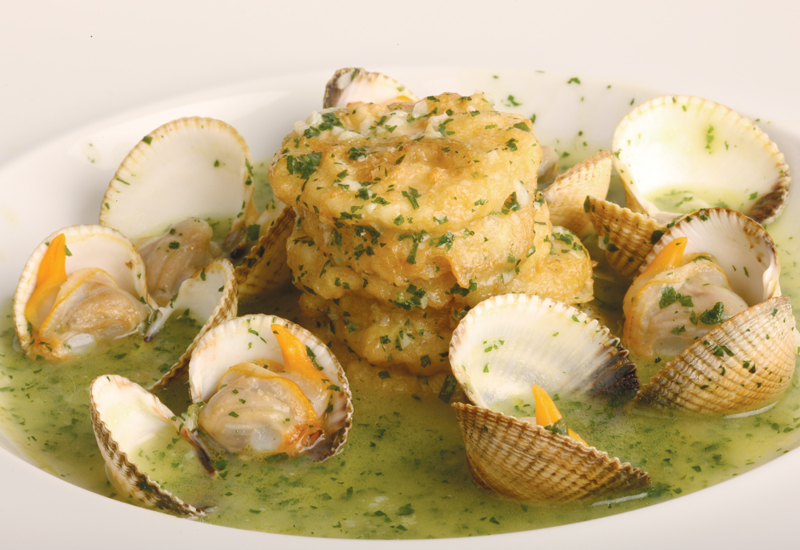 Cheap and traditional dishes, like this cockles and potato presentation from Spanish chef Paco Ron, were a key theme at this year's Madrid Fusion.
Cheap and traditional dishes, like this cockles and potato presentation from Spanish chef Paco Ron, were a key theme at this year's Madrid Fusion.
Madrid Fusion, a feast of epicurean demonstrations and a global showcase for culinary trends returned to the Spanish capital this year, but the effect of the economic slowdown left some delegates and exhibitors disappointed.
The recession impacting Europe could not stop a platoon of masterchefs, delegates and representatives from the world’s food media from converging on Madrid’s Palacio Municipal de Congresos for the seventh congress of Madrid Fusion 2009.
The economic crisis did however, have an effect on the exhibition of new trends and culinary methods, according to one of the show’s star performers.
Chicago restaurant Alinea’s owner Grant Achatz commented: “As always, chefs come to these congresses to share ideas and to be inspired by others; from what I saw and heard there were very few new ideas presented at this year’s congress.
“It is impossible to say what methods will be become real trend-setters as I don’t think any new European cooking methods were demonstrated this year,” he added.
The four-day event, a showcase for cuisines and epicurean methods from across the globe, gave Michelin-star restaurants from Turkey to Peru the chance to demonstrate to industry insiders.
A key theme throughout the show was the use of innovation during tough time — the idea of using fewer or simpler ingredients to create something exciting.
Spanish chef Paco Ron, a connoisseur of Spanish peasant food, showed the auditiorium how to make a simple potato and shellfish dish, which costs just €2 (US $3) to create.
Ron explained: “For many reasons, the cuisine of the poor became traditional for Spain.”
Japanese chef Sorohito Kosugi, whose demonstration on the third day involved the use of sea urchins, said: “I was very proud to introduce one of Japan’s traditional ingredients to other chefs. Uni (sea urchin) is a versatile ingredient and has lots of potential for use in many other cuisines,” he explained.
“My Uni Sugomori Zukuri is assembled using several different UMAMI acids from natural ingredients and is exercised by simple knife techniques without using any machines.
“I enjoyed seeing at Madrid Fusion that each chef has a different focus towards future culinary directions,” added Kosugi.
But American chef Achatz was not the only visitor left disappointed by the event.
One representative from a Japanese-ingredients importer exhibiting at the event said: “The credit crunch definitely had an effect this year and as a result the level of professionalism dropped.

Advertisement
“People who own restaurants came here, but they didn’t present or demonstrate — they only wanted to see what was on offer and then they would disappear,” added the sales manager who asked to remain nameless.
However Caterer’s source praised the quality of the congressional events and demonstrations saying they were “to a high standard, as usual”.
German porcelain manufacturer Hering Berlin’s owner Wiebke Lehmann said the show had been a great success for her firm.
“The show was fantastic,” she said. “Everybody, all the big decision makers, came here to Madrid. We are only a small company and our prices are for the highest end of the market, so we won’t be coming to next year’s show,” added Lehmann. “We will however, be back at Madrid Fusion in 2011.”
The importance of Madrid Fusion was emphasised by co-founder and current managing director Esmeralda Capel, who said the congress was “essential” rather than lavish.
“We do not consider our show extravagant, but necessary for the development of the profession. Our aim when we started Madrid Fusion was to unite culinary trends and roots from all over the world; we wanted to create an exchange forum to enrich gastronomic experiences — after seven years it has become a reference for the culinary world,” she said.
Recognised for its commitment to both traditional Spanish favourites and experimental dishes, next year’s edition could feature a selection of chefs with backgrounds in Middle Eastern culinary traditions.
Madrid Fusion’s Capel said: “We would love to have some Arabic chefs in the line-up for next year.
“This would be an exciting project as Spain has always had many Arabian connections.”
According to the Capel, it might not be long before an Arabian version of the event comes to the region.
“We would be delighted to replicate Madrid Fusion in the Middle East,” she said. “It would be a wonderful opportunity.”








 Search our database of more than 2,700 industry companies
Search our database of more than 2,700 industry companies









